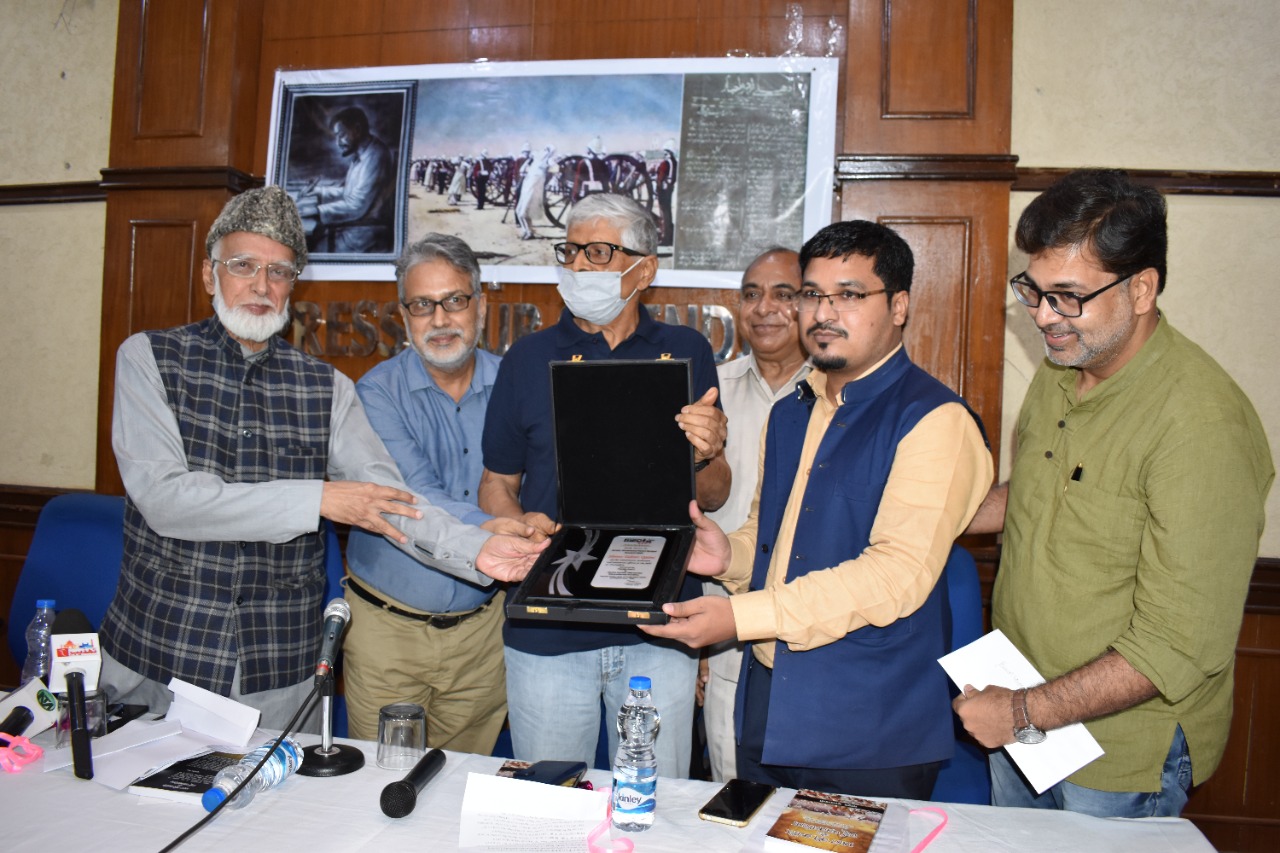 By:Md Irshad Ayub
By:Md Irshad Ayub
Oil is considered to be a boon, a gift of nature which has capable of transforming the shape of the entire region, but at the same time, it must be emphasised that it does not guarantee the prosperity, peace and stability of the region.
“America has no permanent friends or enemies, only interests”- Henry Kissinger
If there is any price of any commodity in the world that determines the growth or slowdown of our economy, it is the price of crude oil. The term Oil refers to the part of fossil fuel and it is believed, was formed by animals and plants organism that had died and further decomposed, and converted into solid rock, may be millions of years ago due to the immense level of heating. Moreover, it also ascertains the bullish or bearish nature of money, which is the blood of economic of a country which works as fuel for the development of the state. Therefore, it is considered to be a major propeller of economic growth and progress. Oil is primarily referred to as ‘liquid gold’ and a full valuable resource. It was given a tremendous importance in every country of the world. Besides it serves as a gateway of foreign exchange. As a result of these attributions, oil always has been a source of conflict in international politics. Despite the fact that the oil has increasingly been instrumental in designing, reshaping and redrawing the world map, international politics, and global diplomacy as well.
Most importantly, it determines the hegemony and supremacy of any country over the world. Henry Kissinger, the former secretary of state of the US, said, “Control oil and you control nation; control food and you control the people”. The emergence of the concept of Pax Britannica (hegemon or preponderance or political ascendancy or partial international order of Britain over the world) was the necessary outcome of the discovery of oil in the mid-19th century. It continued till 1956 (the Suez war), when the British invaded Egypt in October 1956 for controlling the Suez Canal. At once, on 5 November 1956, the Soviet Union came in support of Egypt and threatened to use missiles to defend Egypt. After that, the British surrendered and withdrew its troops from Egypt and on 7 November 1956, the British-led operation came to an end. As a result, Britain lost her dominant power or hegemon strength over the world. The Suez Canal crisis resulted in the termination of Pax Britannica in the world. But at the same time, it must be emphasised that it paved the way for the emergence of Pax Americana. Ipso facto, it was said that “the war to end all wars, instead of bringing peace, resulted in many more wars in future.” Pax Americana began around the middle of the 20th century and continues unabated till date. Now, oil has emerged as the most potent weapon within the global economy and one of the strong determinants of the ‘value of Dollar’ in the international market, alongside the arms and narcotics trade.
The 2nd industrial revolution which commenced around 1870s, witnessed a new phase of industrialisation. This phase differed from the 1stindustrial revolution (1760s), because the 1st was powered by steam engine whereas the 2nd was powered by internal combustion engine (using petrol as a fuel). Oil was first discovered in the U.S. in 1850s. By closing period of 1st IR, crude oil had been successfully extracted near Pennsylvania, America in 1859. And the first U.S. oil refinery came to light in 1861 when the U.S. exported its first shipment of refined oil to London. When the massive amount of oil was used in the production process, the 2nd IR commenced. After that, the importance of oil received a boost body and soul in Europe and America in the immediate sense and in the entire world in the long run. In Middle East region, oil was first discovered at Masjid-e-Suleiman in Iran in 1908 followed by Kuwait and Saudi Arabia. Iran’s oil field was discovered by the British whereas Kuwait and Saudi Arabia’s oil fields were discovered by America.
In 1870, John D Rockefeller founded an oil refining company, name, Standard Oil Company, Cleveland, in the state of Ohio (America). This was the first oil company in the petroleum industry in America. And by the 1880s, John D Rockefeller’s standard oil owned 90% of the U.S. oil refineries and pipelines and the world’s largest oil tanker fleet.
Henry Ford set up his Motor Car Company in 1886. Ford’s invention of the Model T type car came to light in 1908. This type of car was powered by IC engine, which used petrol for running it. This was the world’s first inexpensive and mass produced car. This helped to foster America’s economy and paved the way for a great increase in US’s automobile industry. Mass scale production of oil as well as car, affected the socio-cultural life of Americans and it resulted in the emergence of new social classes in the form of capitalist class and working class. By 1927, the United States became the most motorised country in the world, with one motor vehicle for roughly every five people whereas other major industrial countries like Britain, France, and Germany had about one motor vehicle for every forty-four people. The United States still continues to lead the auto industry supremacy in terms of auto ownership per capita for the next century as well. Refined motor fuel has become America’s indispensable necessity. The US could not have been met both domestic and war demand. The emergence of the concept of Petrodollar is a reflection of same, to maintain hegemony over the world.
Oil became the dominant fuel of the 20th century and part and parcel of the American economy. Oil also played an important role in the ww1 and because the demand for oil had been increased immensely during ww1. With the onset/emergence of ww1, oil became vital for modern welfare, fuelling ships, land vehicles, and military aircraft. It proved that future of oil became obvious, that oil was going to be a crucial resource in warfare for the foreseeable future. The German faced rout was credited to oil. When Germany was marching triumphantly forward against its rivals, the USA entered the war on the side of the Allied powers, which resulted in the defeat of Germany. The USA played a decisive role in the war, because of the fact that the USA was a dominant power in the petroleum industry as well as responsible for more than 65 percent of the world’s crude oil production and refining. During the US war effort, the US herself produced oil about 30 million barrels a month. Moreover, it was five times more than Mexican oil imports. That is why it is commented that entering of the US in the First World War resulted in the commencement of the process of American ascendancy. This process continued for more than 70 years and culminated in the emergence of the USA as the supreme monolithic power in the world on 25, December 1991, after the disintegration and collapse of the USSR and can now dominate the international scene almost without any challenge. This doomed the fate of bipolar order and strengthened the unipolar order in the world.
In 1919, the U.S. Geological survey estimated that the oil supply of the U.S. could run out in 10 years. This survey first time triggered oil security fear in American’s eyes on the one hand and on the other hand changes witnessed in the policy of Britain and France regarding oil. This pressing need of oil has been compelling America to adopt carrot and stick policy as well as unnatural, unethical, immoral, discriminatory and alien policy to get oil to the hilt. Hence, the United States always is hell bent on framing its policy to put itself into an egregious colonialism outlook which will be detrimental to world peace and security and humanity as well. As and when the United States does something inhuman, obnoxious and wretched activity to pursue her Pax Americana policy, she has to chase away the consequent reactions by projecting herself as a victim of global terrorism in the aftermath of any event, whether the event could be war or regime change or hideous clandestine activity and so on. In fact, this type of policy becomes adverse bolt from the blue for world peace. One of my American friends told me a very surprising fact that we have been a country for 239 years and we have been at war for 213 years. And further, he said that the United States has been responsible for the deaths of at least 20 million people in 37 nations since the end of world war two. The need to enhance national prestige in all over the world also inspire, America to wage war and impose the process of the self-own brand of western democracy and neo-colonialism in victim countries. Today the prestige of a nation is measured in terms of power, war warrior, and money and so on. The Iraq war, the war on terror and on-going war in the Middle East are the reflections of the same. Therefore, it is said that oil and politics are interconnected and entwined with each other which was responsible for changes in the political equations in many countries. And from the very beginning of oil, it has brought tribulations in the world as well as invited superpower armed and military interventions, shifting of geopolitics realignments, militarization, foreign debt, power confrontations, policies of state and demands of non-state actors, exploiting strategic confusions, geoeconomics and geopolitics confrontations, clandestine warfare, complex and multifarious interventions and power struggle within the respective countries, which has in turn created local, regional and global power game. Ipso facto, the World has been witnessing and seeing a number of conflicts in the Middle East because of the fact that the Middle East is the geographic “center of gravity” of the world oil industry. Which is why, the doctrine of the war on terror is primarily focused in west Asia due to the abundance of oil in this region.
Oil is a critical ingredient of energy:
Energy is sine qua non for progress and development of a country; therefore, it is placed in the larger milieu of development. It will continue to play a decisive role in international politics, diplomacy and international relation. Moreover, it has been designed and redesigned to pave the way for ushering in a new world oil order. So, it became a prominent feature of global economy and diplomacy. Energy is the essential ingredient of the socio-economic and technological development of the nation-state. Because of the fact that it affects virtually all aspects of human life and tremendously contribute to economic, social as well as political development and the well-being of people as well. Most crucially, it is at the nexus of national security and economic prosperity which plays a pivotal role in expounding international relations, petro-diplomacy and geoeconomics in unequivocal terms globally. It is one of the substantial inputs for the industrial growth and sustenance of human lives. Energy diplomacy and economic diplomacy are also essential features of energy which have become the centre of gravity in the geo-economics theatre, and a state deploys it at the cost of fragile national security threat. And additionally, energy diplomacy and economic diplomacy are amalgamated with oil politics.
Oil is considered to be a boon, a gift of nature which has capable of transforming the shape of the entire region, but at the same time, it must be emphasised that it does not guarantee the prosperity, peace and stability of the region. Oil has been very instrumental in shaping the internal power struggle in the world especially the Arab world. It has created political instability and chaos and brought about a regime change situations as well as a chaotic ideologically oriented non-state violent actors who push entire region into the Stone Age. This has been only creating havoc and ethnic exterminating in the Arab world. That is why, it is commented that oil was considered to be a boon turned into a bane in the entire Arab world that only brought tribulations not effluences in the region , in fact it has been onerous and catastrophic for the region.(Millat Times)
https://www.facebook.com/mdirshad.ayub
















